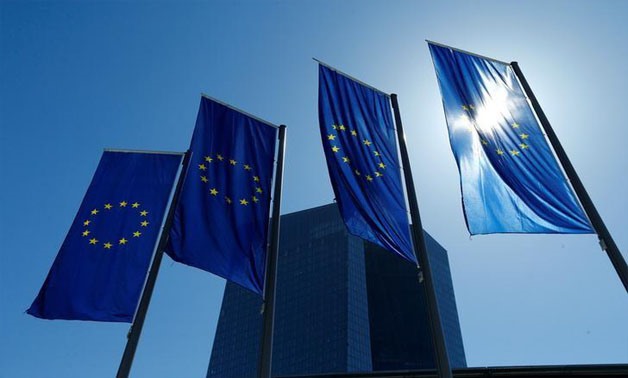
European Union flags flutter outside the headquarters of the European Central Bank (ECB) in Frankfurt, Germany, April 21, 2016. REUTERS/Ralph Orlowski/File Photo
CAIRO – 20 March 2018: Egypt’s exports to the European Union (EU) increased 24 percent year-on-year in the first 11 months of 2017, reaching €7.5 billion, Trade Minister Tarek Kabil said Tuesday.
Kabil said that Egypt’s imports from the EU dropped by three percent in the same period, to reach €18.2 billion, compared to €18.8 billion in 2016.
This came during Kabil’s meeting with European Union Trade Commissioner Cecilia Malmstrom in Brussels on the sidelines of the 10th Union for the Mediterranean Trade Ministerial Conference.
Egypt’s trade deficit with the EU dropped by 16 percent in the first 11 months of 2017, recording €10.7 billion, compared to €12.76 billion in the same period of 2016.
Kabil attributed the drop to the increase in Egypt’s exports to the EU and the decline in its imports from the bloc.
He said that his ministry will be working in the coming period on reducing the trade deficit with the EU through boosting Egyptian exports to the bloc, especially the goods that have competitive edge in European markets.
Kabil said that the EU is the biggest investor in Egypt, constituting 75 percent of total foreign inflows to the country during the last period, adding that the EU is the most important export market for Egypt, capturing 22.7 percent of Egypt’s exports to foreign markets.
Kabil said that his meeting with Malmstrom touched on Egypt’s economic reform program and the country’s efforts to transform into a regional hub to export natural gas in cooperation with Greece and Cyprus.
The Minister shed light on the importance of the EU’s support for these efforts in light of the member states’ increasing demand of gas.
Kabil added that Egypt is seeking to hold an annual commercial committee between Cairo and Brussels to discuss economic challenges facing both sides and to boost trade exchange between Egypt and the EU.
Malmstrom said that that the EU is keen on enhancing economic cooperation with
Egypt, saying that economic cooperation between North and South Mediterranean countries helps in achieving stability in the Middle East and Mediterranean region.
Trade between Egypt and the EU has significantly improved after the EU-Egypt Association Agreement came into force in 2004. The agreement creates a free-trade area between Egypt and the EU by removing tariffs on industrial products and making agricultural products easier to trade.
Trade between Egypt and the EU has more than doubled from €11.8 billion in 2004 to €27.3 billion in 2016, according to figures from the European Commission.
 Photo courtesy of the European Commission
Photo courtesy of the European Commission
Egypt’s main exports to the EU in 2016 included fuel and mining products, chemicals and textiles and clothing, while Egypt’s main imports from the EU in the same year included machinery and transport equipment, chemicals, fuels and mining products and agricultural products.
In June 2013, the EU and Egypt began discussing how to deepen their trade and investment relations through a Deep and Comprehensive Free Trade Agreement (DCFTA), which will aim to improve market access and the investment climate. It would also support Egyptian economic reforms, according to the European commission.
The deal would extend beyond the Association Agreement to include trade in services, government procurement, competition, intellectual property rights and investment protection.
In January, Minister of Investment and International Cooperation Sahar Nasr signed two grants with the European Neighborhood Policy and Enlargement Negotiations. The first is worth €27 million to support the national population strategy, while the second comes as part of the European Neighborhood Instrument (ENI).
ENI, managed by the Directorate General for Neighborhood and Enlargement Negotiations, is the key European Union (EU) financial instrument for EU cooperation with Egypt for the period 2014-2020. It replaces the European Neighborhood and Partnership Instrument (ENPI) of 2007-2013.
The EU has allocated €209 million to ENI to support 13 countries, including Egypt. EU assistance to Egypt currently stands at more than €1.3 billion.
The new EU-Egypt Single Support Framework 2017-2020, which sets out the EU's priorities for bilateral assistance to Egypt under ENI, foresees an allocation of €432-€528 million for Egypt.

Comments
Leave a Comment